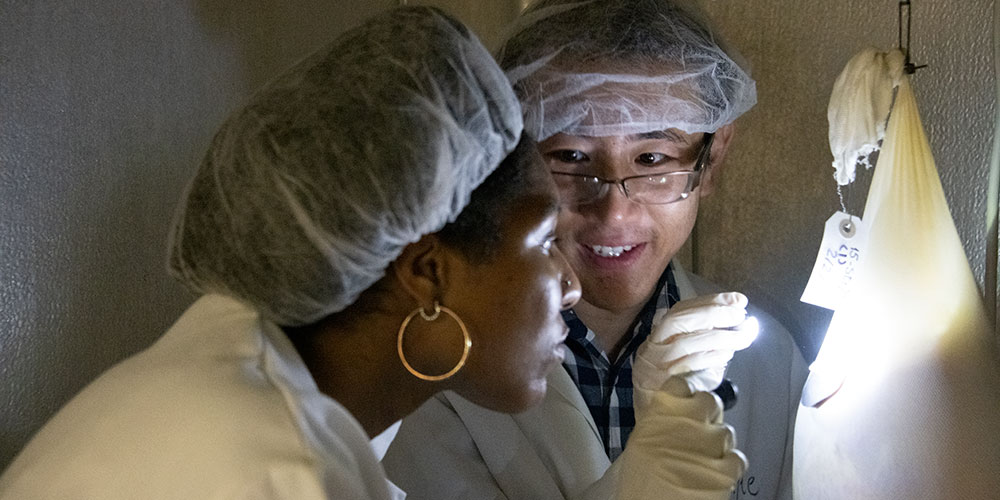
Food Science & Technology
A Food Scientists solves problems by applying science to food (biology, chemistry, engineering, mathematics, biochemistry, physics, etc.) to ensure that the food products that reach consumers are both safe and meet quality standards. Students who graduate with a bachelor's degree in food science can work in the areas of product development, quality control, technical sales, production management, veterinary science, as well as other areas such as food law and food packaging. The Food Science & Technology concentration is in the Food Science, Nutrition and Health Promotion major.
Occupational Outlook Handbook: The median annual wage for food scientists was $62,910 in May 2017. Overall employment of food scientists is projected to grow 7 percent from 2016 to 2026, about as fast as the average for all occupations. Employment of food scientists is projected to grow as research into agricultural production methods and techniques continues.
View the curriculum
Careers
This degree program focuses on training students to either go to graduate school in food science or related areas or work in one of the following career paths:
- Consumer Safety Officer
- Food Inspector
- Food Law
- Food Microbiologist
- Food Policy Analyst
- Food Scientist and Technologist
- Processing/Food Engineer
- Product Development Technologist
- Research Scientist
Food Science Minor
A minor in food science is available. Students complete 18 hours of courses in Applied Food Chemistry, Composition and Chemical Reactions of Foods, Microbiology of Foods, Food Preservation Technology, plus other courses from which students can choose.
Meat Science Endorsement
The Department of Biochemistry, Nutrition and Health Promotin and the Department of Animal and Dairy Sciences offer a Meat Science Endorsement for students who wish to specialize in the meat processing industry. The 24 credit hour curriculum equips students to be career-ready professionals with a comprehensive understanding of the industry and a skill-set designed for them to make an immediate impact in meat science government, academic, or industry positions upon graduation. More information
Transfer Guide
Students may transfer to Mississippi State University from regionally accredited community, junior or senior colleges for any period of enrollment, provided they have earned a 2.0 GPA (as computed by Mississippi State University) on all college courses attempted as well as earned a 2.0 GPA on the 30-hours of core courses. Transfer students should look at the transfer course equivalent guide to determine which courses will transfer.
Internships
Internships and/or professional experience prepares students for future careers in Food Science. A significant percentage of employers prefer students with work experience outside of a college environment to students with no experience, according to new data released by the Chronicle of Higher Education. Students should check with the MSU Career Center or the program coordinator for internship opportunities.
Graduate Studies
A student may work toward a Master of Science in Food Science, Nutrition and Health Promotion with a concentration in Food Science and Technology by selecting courses from Food Science, Nutrition and Health Promotion and allied areas such as biochemistry, microbiology, animal and dairy sciences, and other disciplines. Faculty, staff members, and facilities of the cooperating departments are utilized. A Bachelor of Science in Food Technology, Food Science, or related areas will be considered to meet the prerequisites for study toward an advanced degree. Students from other disciplines may be required to take leveling courses generally not to exceed 15 semester hours. Learn More
Scholarships
Students may apply for university, college and departmental scholarships through one application. You can find the scholarship application once you login to myState. Under the banner tab, select Financial Aid and Scholarships. The application is listed as Submit/Revise General Scholarship Application.
Organizations
The Department of Food Science, Nutrition and Health Promotion encourages its students to take advantage of the many experiences offered by the departmental student organizations and teams. Clubs are a great way to develop leadership skills and to learn about the various food industries. Visit the organizations page to find out more.
Quick Links:
- Academic Calendar
- Apply Online
- Courses
- Explore our Facilities
- Financial Aid
- Find a Major
- Graduate Bulletin
- Locate Us
- Schedule a Visit
- Student Housing
- Student Organizations
- Undergraduate Bulletin
